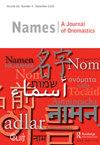基于语料库的拟人词性别识别方法
IF 0.6
3区 文学
0 LANGUAGE & LINGUISTICS
引用次数: 4
摘要
本文提出了一系列根据专有名称与单词的共现性和语法特征自动确定专有名称性别的方法。尽管所获得的结果是针对西班牙语给定的名称,但这里提出的方法可以很容易地复制并用于其他语言的名称。文献中报道的大多数方法都使用预先存在的名字列表,这些列表需要昂贵的手动处理,而且往往很快就会过时。相反,我们建议使用语料库。这样做可以获得真实和最新的姓名性别链接。为了测试我们方法的有效性,我们探索了各种机器学习方法以及另一种基于简单同现频率的方法。后者产生了最好的结果:在约10000个混合名称的数据库中,准确率为93%,召回率为88%。我们的方法可以应用于各种自然语言处理任务,如信息提取、机器翻译、回指解析或大规模递送或电子邮件通信等。本文章由计算机程序翻译,如有差异,请以英文原文为准。
Corpus-Based Methods for Recognizing the Gender of Anthroponyms
This paper presents a series of methods for automatically determining the gender of proper names, based on their co-occurrence with words and grammatical features in a large corpus. Although the results obtained were for Spanish given names, the method presented here can be easily replicated and used for names in other languages. Most methods reported in the literature use pre-existing lists of first names that require costly manual processing and tend to become quickly outdated. Instead, we propose using corpora. Doing so offers the possibility of obtaining real and up-to-date name-gender links. To test the effectiveness of our method, we explored various machine-learning methods as well as another method based on simple frequency of co-occurrence. The latter produced the best results: 93% precision and 88% recall on a database of ca. 10,000 mixed names. Our method can be applied to a variety of natural language processing tasks such as information extraction, machine translation, anaphora resolution or large-scale delivery or email correspondence, among others.
求助全文
通过发布文献求助,成功后即可免费获取论文全文。
去求助
来源期刊

Names-A Journal of Onomastics
Multiple-
CiteScore
1.30
自引率
50.00%
发文量
23
期刊介绍:
Names, the journal of the American Name Society, is one of the world"s leading journals in the study of onomastics. Since the first issue in 1952, this quarterly journal has published hundreds of articles, reviews, and notes, seeking to find out what really is in a name, and to investigate cultural insights, settlement history, and linguistic characteristics revealed in names. Individuals subscribing to Names automatically become members of the American Name Society and receive the journal as part of their membership.
 求助内容:
求助内容: 应助结果提醒方式:
应助结果提醒方式:


